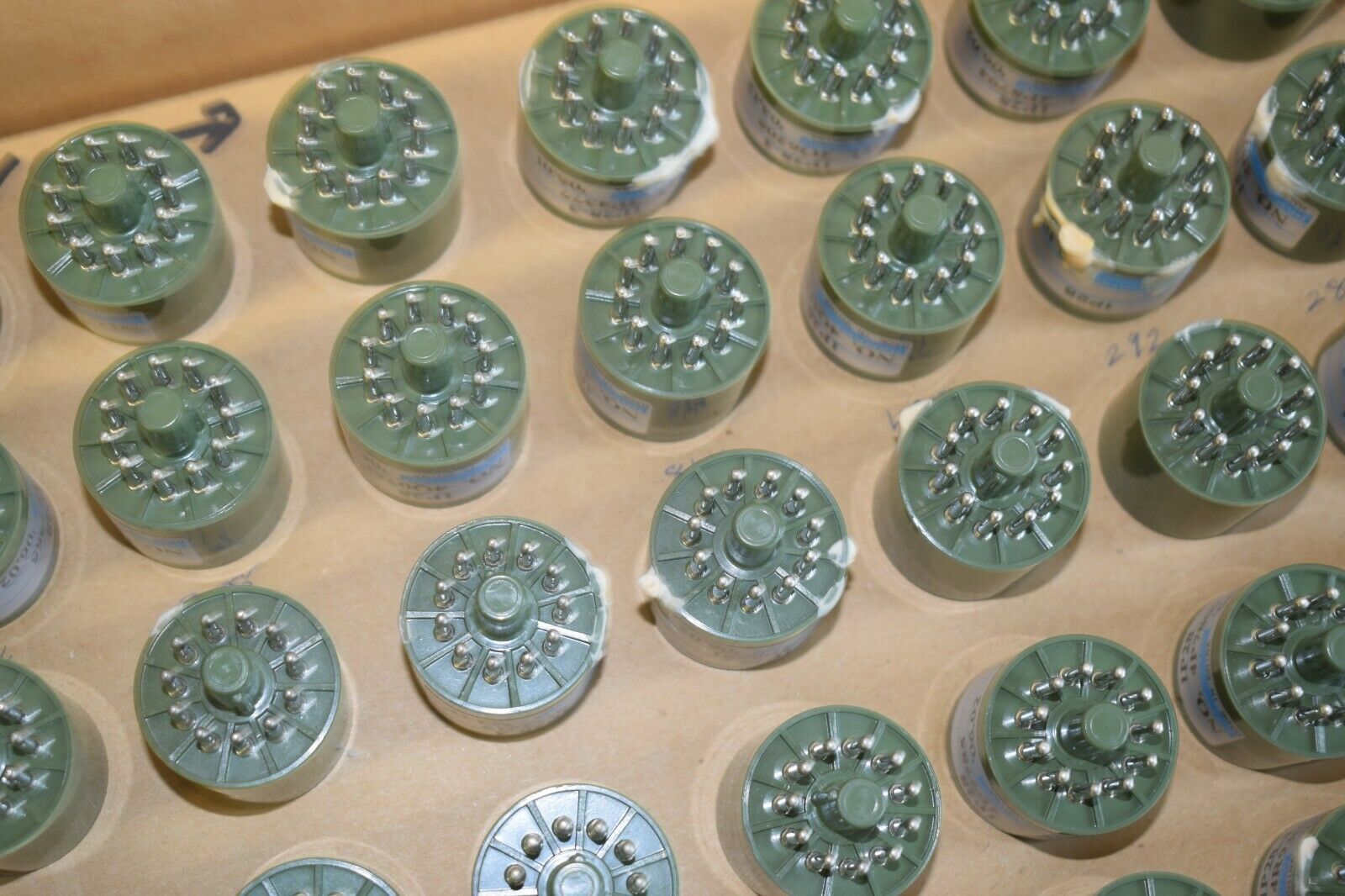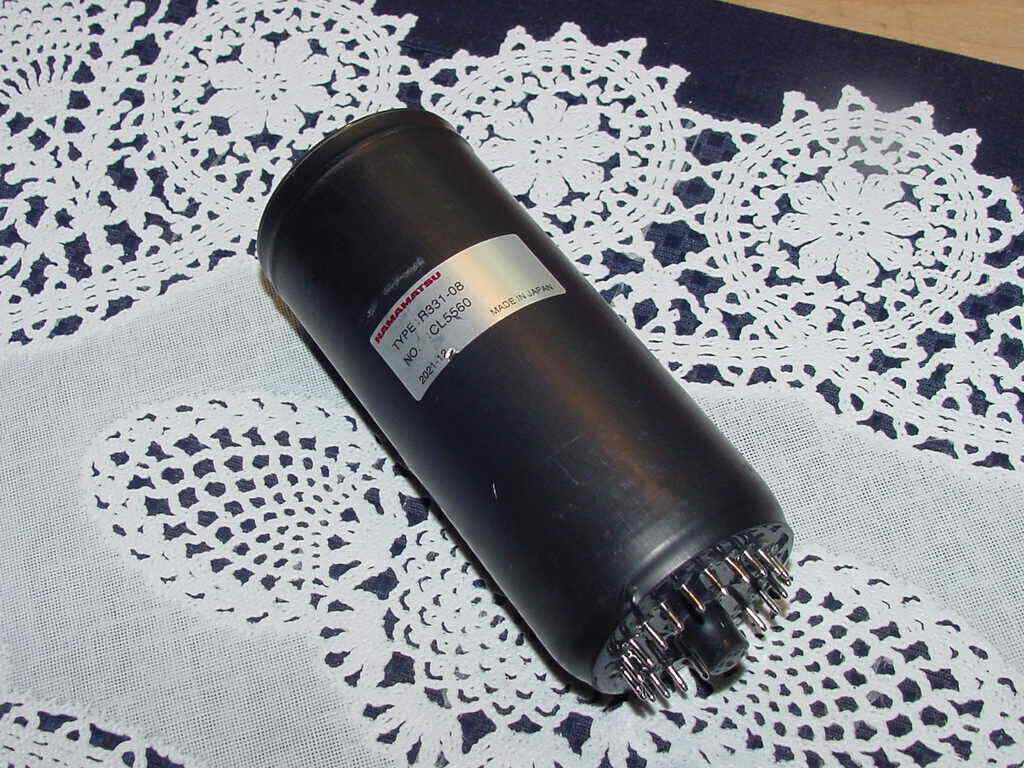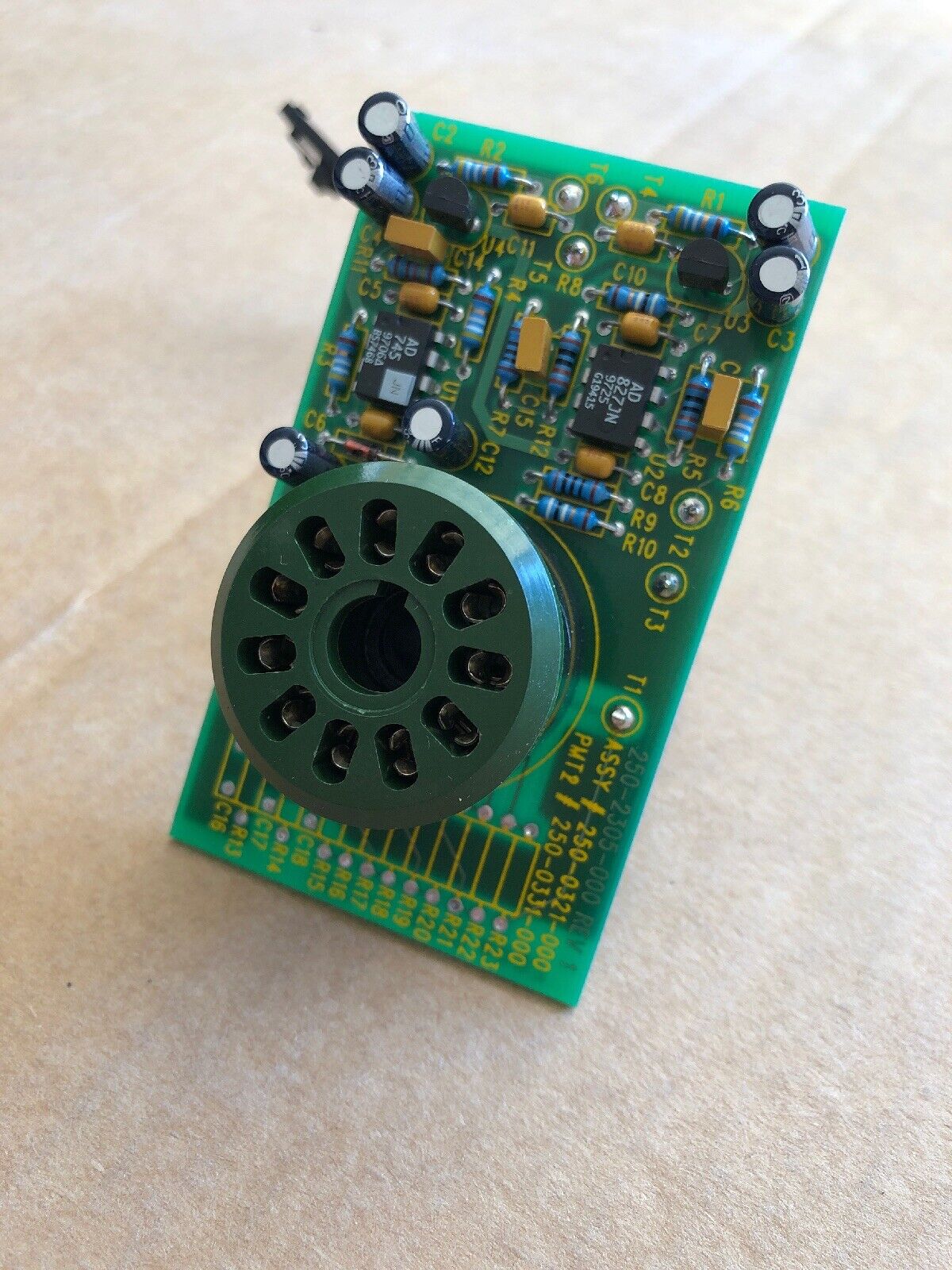-40%
Hamamatsu Photomultiplier tube P/N R3896 with C6270 Socket
$ 102.96
- Description
- Size Guide
Description
Pulled from a working Becton Dickinson BD FACSJazz Cell Sorter. Running two lasers. Items are all in excellent condition, never been touched. Shield was removed for pictures only.HIGH VOLTAGE POWER SUPPLY SOCKET ASSEMBLY C6270
Information furnished by HAMAMATSU is believed to be reliable. However, no responsibility is assumed for possible inaccuracies or omissions. Specifications are subject to change without notice. No patent rights are granted to any of the circuits described herein. © 1998 Hamamatsu Photonics K.K. Subject to local technical requirements and regulations, availability of products included in this promotional material may vary. Please consult with our sales office. SPECIFICATIONS FEATURES Parameter Superior DC Output Linearity Fast High Voltage Programming Response Low Power Consumption Wide High Voltage Output Range Low Ripple/Noise Low Cost Description / Value Unit Applicable PMT Linear DC Output of PMT Line Regulation Against 1V Input Change Ripple/Noise in High Voltage Output High Voltage Control High Voltage Programming Response Temperature Coefficient of High Voltage Output Operating Temperature Storage Temperature Output Voltage Range at – 1000V at – 500V Input Current at Maximum High Voltage Input Voltage 28mm(1-1/8 inch) diameter side-on types +15 ± 1 45 0 to -1250 100 50 ±0.01 ±0.01 0.008 80 0 to +50 -20 to +60 0 to +5V or external 50kΩ potentiometer — NOTE: a within 2% linearity For 0 to 99% high voltage change
PHOTOMULTlPLlER TUBE R3896
High Q.E Multialkali Photocathode New Electro–Optical Design 28mm (1-1/8 Inch) Diameter, 9-Stage, Side-On Type FEATURES lnformation furnished by HAMAMATSU is believed to be reliabIe. However, no responsibility is assumed for possibIe inaccuracies or ommissions. Specifications are subject to change without notice. No patent right are granted to any of the circuits described herein. © 1994 Hamamatsu Photonics K.K. Subject to local technical requirements and regulations, availability of products included in this promotional material may vary. Please consult with our sales office. PHOTOMULTlPLlER TUBE R3896 APPLICATIONS Biomedical Analysis Environmental Monitoring Spectroscopy Semiconductor Industry High Sensitivity Luminous .......................................... Radiant at 450nm (peak) ............................. at 633nm ......................................... Quantum Efficiency at 260nm (peak) .................................... at 633nm (peak) .................................... Blood Analyzer, Flow Cytometer, DNA Sequencer NOx Analyzer Fluorescence Spectrometer, Raman Spectrometer, UV–VIS Spectrometer Wafer Inspection, Particle Counter Wide Spectral Response ............................ High Signal to Noise Ratio Newly Designed Electro Optical Structure 525 A/lm (Typ.) 90mA/W (Typ.) 73mA/W (Typ.) 30% (Typ.) 14% (Typ.) 185 to 900nm Figure 2: Typical Spectral Response Figure 1: Electro Optical Structure LIGHT PHOTOELECTRON TRAJECTORIES GRILL GLASS BULB ANODE PHOTOCATHODE 9th DYNODE 2nd DYNODE 1st DYNODE TPMSC0024EA TPMSB0049EB 100 10 1 0.1 0.01 100 200 300 400 500 600 700 800 900 1000 WAVELENGTH (nm) CATHODE RADIANT SENSITIVITY (mA/W) QUANTUM EFFICIENCY (%) QUANTUM EFFICIENCY R3896 R928 CATHODE RADIANT SENSITIVITY PATENT PENDING GENERAL Parameter Description/Value Unit Spectral Response Wavelength of Maximum Response 185 to 900 nm nm Photocathode MateriaI 450 Structure Anode to Last Dynode 4 pF Anode to All Other Electrodes 6 pF Minimum Effective Area Multialkali mm Window Material Weight 8 24 Approx. 45 g Dynode Direct Interelectrode Capacitances Base Supply Voltage Between Anode and Cathode Between Anode and Last Dynode 1250 250 0.1 Vdc Vdc Average Anode Current A mA Ambient Temperature UV glass Circular-cage Number of Stages JEDEC No. B11-88 CHARACTERISTlCS (at 25 ) NOTES Cathode Sensitivity Anode Dark Current F (after 30min. storage in the darkness) Anode Current Stability J A: B: C: D: E: Averaged over any interval of 30 seconds maximum. The light source is a tungsten filament lamp operated at a distribution temperature of 2856K. Supply voltage is 100 volts between the cathode and all other electrodes connected together as anode. The value is cathode output current when a blue filter(Coming CS-5-58 polished to 1/2 stock thickness) is interposed between the light source and the tube under the same condition as Note B. Red/White ratio is the quotient of the cathode current measured using a red filter(Toshiba R-68) interposed between the light source and the tube by the cathode current measured with the filter removed under the same conditions as Note B. Measured with the same light source as Note B and with the voltage distribution ratio shown in Table 1 below. Current Hysteresis Voltage Hysteresis Radiant at 254nm Red/White Ratio D Blue C 0.4 15 450nm 633nm 852nm 90 73 5.0 450nm 633nm 852nm 24.8 14.3 0.73 Anode Pulse Rise Time G Electron Transit Time H Transit Time Spread (TTS) I Time Response Electrodes K Dy1 Dy2 Dy3 Dy4 Dy5 Dy6 Dy7 Dy8 Dy9 P Ratio 1 1111 11111 SuppIy Voltage : 1000Vdc, K : Cathode, Dy : Dynode, P : Anode Quantum Efficiency at 254nm 29.3 Gain E 9.5 106 SuitabIe Socket E678–11A (option) MAXIMUM RATINGS (Absolute Maximum Values) Parameter Value Unit PHOTOMULTlPLlER TUBE R3896 Luminous B 475 60 525 Table 1:Voltage Distribution Ratio –80 to +50 Parameter Typ. Min. Max. Unit Anode Sensitivity Luminous E 2.2 1.2 0.1 1.0 22 % % mA/W A/lm-b mA/W mA/W mA/W ns ns ns A/lm % % % % nA 3000 5000 10 50 A/lm F: G: H: I: J: Measured with the same supply voltage and voltage distribution ratio as Note E after removal of light. The rise time is the time for the output pulse to rise from 10% to 90% of the peak amplitude when the entire photocathode is illuminated by a delta function light pulse. The electron transit time is the interval between the arrival of delta function light pulse at the entrance window of the tube and the time when the anode output reaches the peak amplitube. In measurement, the whole photocathode is illuminated. Also called transit time jitter. This is the fluctuation in electron transit time between individual pulses in the signal photoelectron mode, and may be defined as the FWHM of the frequency distribution of electron transit times Hysteresis is temporary instability in anode current after light and voltage are applied. (1)Current Hysteresis The tube is operated at 750 volts with an anode current of 1 microampere for 5 minutes. The light is then removed from the tube for a minute. The tube is then re-illuminated by the previous light level for a minute to measure the variation. (2)Voltage Hysteresis The tube is operated at 300 volts with an anode current of 0.1 micro-ampere for 5 minutes. The light is then removed from the tube and the supply voltage is quickly increased to 800 volts. After a minute, the supply voltage is then reduced to the previous value and the tube is re-illuminated for a minute to measure the variation. Hysteresis = 100(%) lmax. li lmin. TPMSB0002EA TIME max. l min. l il ANODE CURRENT 0 5 6 7 (minutes) 9 Figure 3: Typical Temperature Characteristics of Dark Current (at 1000V, after 30minutes storage) Figure 4: Anode Luminous Sensitivity and Gain Characteristics Figure 5: Typical Time Response Figure 6: Typical Temperature Coefficient of Anode Sensitivity TPMSB0050EA 100 10 1 0.1 –40 –20 0 +20 +40 TEMPERATURE (°C) ANODE DARK CURRENT (nA) 0.01 TPMSB0051EA 500 700 1000 1500 2000 GAIN ANODE LUMINOUS SENSITIVITY (A/lm) 102 103 104 105 106 101 SUPPLY VOLTAGE (V) GAIN (TYP.) 104 105 106 107 108 103 ANODE LUMINOUS SENSITIVITY (MIN.) ANODE LUMINOUS SENSITIVITY (TYP.) 500 1000 1500 2000 TIME (ns) SUPPLY VOLTAGE (V) TRANSIT TIME RISE TIME 1 100 10 TPMSB0052EA TPMSB0053EA WAVELENGTH (nm) TEMPERATURE COEFFICIENT (%/ ) 200 400 600 800 1000 +4.0 +1.0 -2.0 +3.0 +2.0 0 -1.0 -0.13%/ -0.25%/ PHOTOMULTlPLlER TUBE R3896 TPMS1013E03 OCT. 1994 Figure 7: Dimensional Outline and Basing Diagram (Unit:mm) Figure 8: Optional Accessories (Unit:mm) Socket E678-11A D Type Socket Assembly E717-21 BOTTOM VIEW (BASING DIAGRAM) Warning–Personal Safety Hazards Electrical Shock–Operating voltages applied to this device present a shock hazard. Hamamatsu also provides C4900 series compact high voltage power supplies and C6270 series DP type socket assemblies which incorporate a DC to DC converter type high voltage power supply. PATENT PENDING : JAPAN 4, USA 4, EUROPE 4 POTTING COMPOUND TACCA0002ED R to R10 C1 to C3 : 330k : 0.01 F 3.5 33.0 0.3 49.0 0.3 29 38.0 0.3 4.8 41.0 0.5 450 10 5 31.0 0.5 HOUSING (INSULATOR) R10 R9 R8 R7 R6 R5 R4 R3 R2 R1 DY9 DY8 DY7 DY6 DY5 DY4 DY3 DY2 DY1 C3 C2 C1 SIGNAL GND SIGNAL OUTPUT RG-174/U (BLACK) –HV AWG22 (VIOLET) P K 10 POWER SUPPLY GND AWG22 (BLACK) SOCKET PMT PIN No. 9 8 7 6 5 4 3 2 1 11 TPMSA0008EA 1 2 4 3 5 7 6 8 9 10 DY1 K DY2 DY3 DY4 DY5 DY6 DY7 DY8 DY9 P DIRECTION OF LIGHT 28.5 1.5 8MIN. T9 BULB PHOTOCATHODE 24MIN. 49.0 2.5 80MAX. 94MAX. 32.2 0.5 11 PIN BASE JEDEC No. B11-88 11 PHOTO - CATHODE 3.25 2.5 6.0 3.5 TPMSA0009EA Cross Section TACCA0064EA 33 5 49 3.5 38 29 4 18 HAMAMATSU PHOTONICS K.K., Electoron Tube Center 314-5, Shimokanzo, Toyooka-village, Iwata-gun, Shizuoka-ken, 438-0193, Japan, Telephone: (81)539/62-5248, Fax: (81)539/62-2205 U.S.A.: Hamamatsu Corporation: 360 Foothill Road, Bridgewater. N.J. 08807-0910, U.S.A., Telephone: (1)908-231-0960, Fax: (1)908-231-1218 Germany: Hamamatsu Photonics Deutschland GmbH: Arzbergerstr. 10, D-82211 Herrsching am Ammersee, Germany, Telephone: (49)8152-375-0, Fax: (49)8152-2658 France: Hamamatsu Photonics France S.A.R.L.: 8, Rue du Saule Trapu, Parc du Moulin de Massy, 91882 Massy Cedex, France, Telephone: (33)1 69 53 71 00, Fax: (33)1 69 53 71 10 United Kingdom: Hamamatsu Photonics UK Limted: Lough Point, 2 Gladbeck Way, Windmill Hill, Enfield, Middlesex EN2 7JA, United Kingdom, Telephone: (44)181-367-3560, Fax: (44)181-367-6384 North Europe: Hamamatsu Photonics Norden AB: Färögatan 7, S-164-40 Kista Sweden, Telephone: (46)8-703-29-50, Fax: (46)8-750-58-95 Italy: Hamamatsu Photonics Italia: S.R.L.: Via Della Moia, 1/E, 20020 Arese, (Milano), Italy, Telephone: (39)2-935 81 733, Fax: (39)2-935 81 74
















